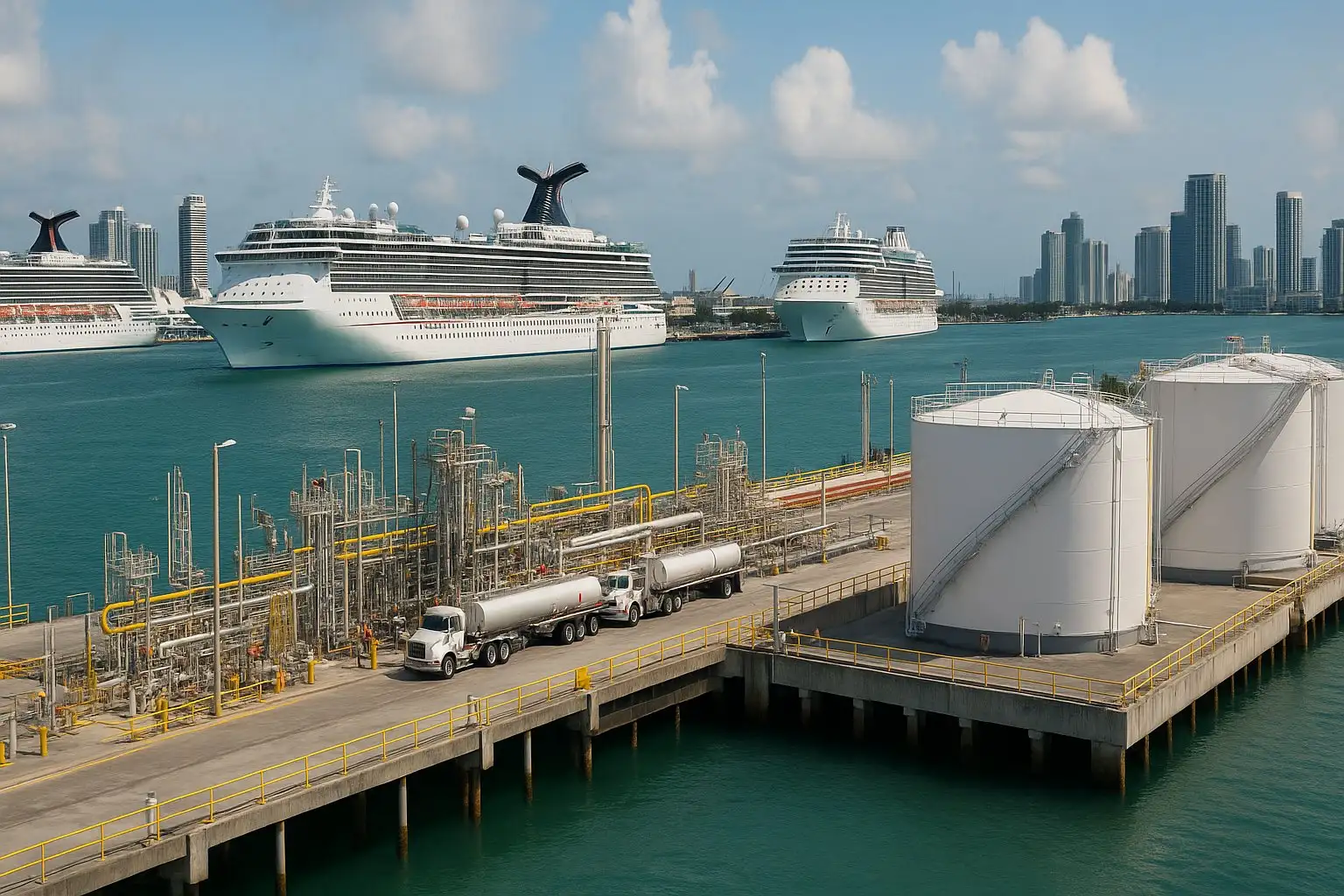
Miami-Dade County is moving quickly to secure control of a vital piece of land on Fisher Island as concerns mount over the future of PortMiami’s only marine fuel hub. The 9.6-acre property, previously owned by TransMontaigne Partners and now controlled by a development group linked to HRP, is at the center of a heated debate that could reshape both the island’s exclusive landscape and the port’s long-term operations.
For decades, the bunker terminal on Fisher Island has supplied fuel to cruise ships and cargo vessels docking at PortMiami. Its strategic position has allowed the port to operate efficiently as one of the busiest cruise and cargo gateways in the world. But when the property changed hands for approximately $180 million this summer, uncertainty spread across the shipping industry. The sale agreement allows the terminal to continue running through at least 2027, yet the looming possibility of redevelopment sparked urgent calls for government action.
Cruise line executives, shipping operators, and logistics experts warn that losing the on-site fuel facility would have severe ripple effects. Without the bunker, ships docking at PortMiami would be forced to refuel elsewhere, creating logistical nightmares and pushing costs higher. Industry leaders point out that any interruption could weaken Miami’s competitive advantage as the “Cruise Capital of the World.”
The issue reached a breaking point earlier this month when Royal Caribbean and other major cruise operators publicly urged Miami-Dade commissioners to intervene. They emphasized that a secure and accessible fuel hub is critical for operations that bring millions of passengers and billions of dollars into the local economy. In their view, a loss of fueling capacity at the port could affect not only their fleets but also the wider network of suppliers, tourism businesses, and workers that depend on cruise traffic.
Miami-Dade commissioners are now weighing options that range from negotiating directly with the property’s new owners to pursuing eminent domain, a legal process that would allow the county to seize the land for public use with compensation. The matter is expected to come to a head during the commission’s October 9 meeting, when officials may decide whether to authorize formal negotiations or take stronger measures.
Supporters of the acquisition argue that it is not just about protecting fuel supplies, but about safeguarding the future of PortMiami itself. They note that the port’s reputation as a reliable hub is at stake. With competitors such as Port Everglades and international terminals seeking to expand, Miami cannot afford to risk disruptions. Securing the Fisher Island land buy would give the county greater control over long-term planning and ensure continuity for one of its most important economic engines.
Still, the debate has provoked controversy. Fisher Island residents, known for their luxury homes and high-profile status, have raised concerns about keeping an industrial fuel terminal so close to their residential enclave. Some argue that the land should be repurposed for cleaner, more environmentally friendly uses, reflecting broader trends in waterfront redevelopment. Environmental advocates have also questioned whether maintaining a large fuel storage facility in such a sensitive coastal area aligns with Miami’s long-term resilience goals, particularly as the region grapples with sea-level rise and hurricane threats.
County leaders acknowledge these concerns but stress that any transition must balance environmental considerations with economic realities. Cleanup obligations, zoning restrictions, and environmental permitting would play significant roles in shaping the site’s future. Officials say the immediate priority is ensuring stability, even if discussions about redevelopment or greener energy alternatives follow later.
The cruise industry’s involvement has added weight to the county’s position. Executives argue that fuel logistics are not easily replicated and that losing direct access would complicate operations. In testimony before commissioners, they described scenarios where ships might have to delay departures, extend layovers, or divert to other ports. For an industry built on precise scheduling and consumer satisfaction, those risks are unacceptable.
Beyond the cruise sector, the implications of the Fisher Island land buy extend to Miami’s cargo trade. PortMiami handles a significant share of container traffic moving between Latin America, the Caribbean, and the U.S. mainland. Maintaining reliable fueling options for cargo vessels is critical to keeping trade routes efficient and competitive. Businesses that rely on just-in-time delivery models could face cascading effects if fueling disruptions slow shipping.
The Fisher Island case also highlights a broader tension between luxury development and industrial infrastructure in South Florida. As demand for upscale real estate surges, many prime waterfront sites once dedicated to maritime or industrial use are being redeveloped. Critics argue that this trend could weaken Miami’s economic foundation by prioritizing short-term gains over long-term sustainability. The county’s willingness to step in at Fisher Island could signal a new approach, one that seeks to preserve strategic assets even amid soaring property values.
Looking ahead, Miami-Dade officials must navigate complex negotiations. The property’s current owners are likely to seek significant compensation, given the high price they paid for the acquisition. Legal experts suggest that eminent domain could prove costly and time-consuming, potentially dragging the issue through courts for years. At the same time, industry pressure to resolve the matter swiftly is intensifying.
For now, all eyes are on the October 9 commission meeting. The outcome could determine not only the fate of Fisher Island’s fuel terminal but also the future direction of PortMiami as it competes in a global marketplace. Whatever decision is made, it will likely set a precedent for how Miami balances its dual identity as both a luxury destination and a powerhouse of maritime commerce.
As the county moves closer to a decision, the stakes remain high. The Fisher Island land buy represents more than a real estate deal—it is a pivotal test of Miami’s ability to protect its economic lifelines in the face of development pressures. Whether through purchase, eminent domain, or compromise, the resolution will shape the trajectory of the port, the cruise industry, and the broader community for years to come.